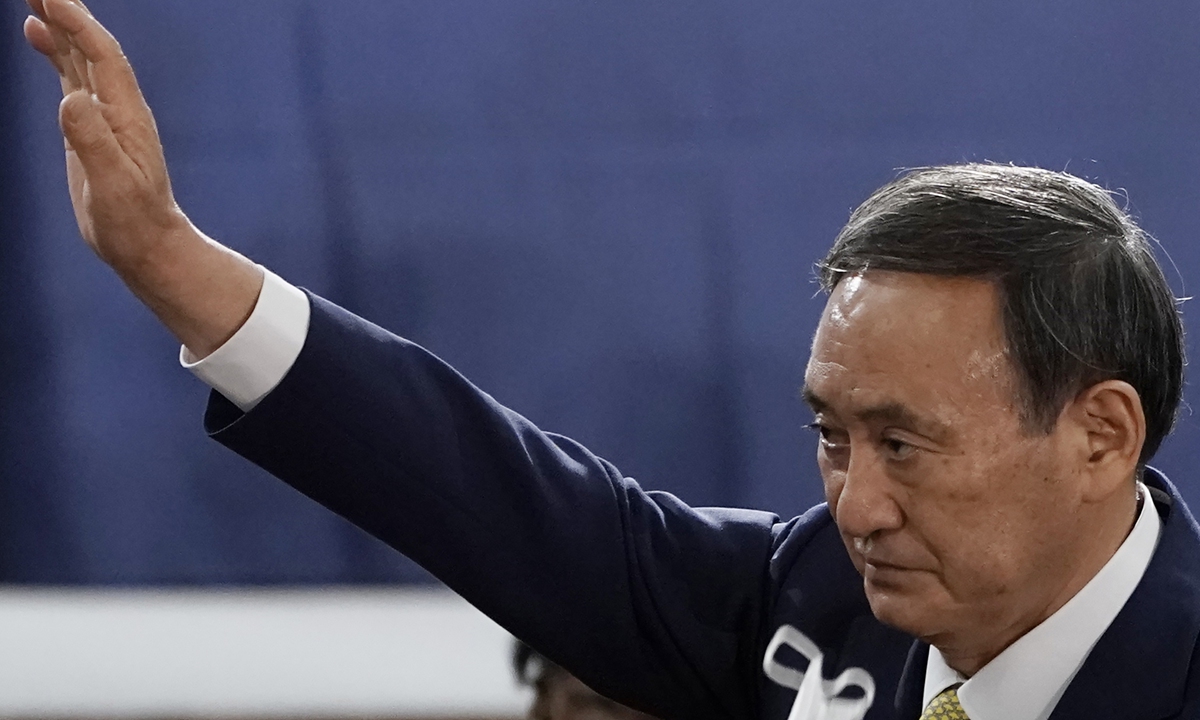Suga to maintain Japan's China policy: Global Times editorial
Source: Global Times Published: 2020/9/14 18:56:29

Japan's Chief Cabinet Secretary Yoshihide Suga reacts after being elected as new head of Japan's ruling Liberal Democratic Party at the party's leadership election in Tokyo on Monday. Photo: AFP
As anticipated, Yoshihide Suga won the election for the leadership of Japan's Liberal Democratic Party (LDP) on Monday afternoon. He defeated Fumio Kishida and Shigeru Ishiba by a landslide victory. Since the LDP is Japan's ruling party, it means Suga will be Japan's new prime minister in two days, succeeding Shinzo Abe.
The 71-year-old Suga has served as Abe's chief cabinet secretary for nearly eight years. He was with Abe throughout Abe's second term. After becoming the new prime minister, Suga's mission, perhaps, might be just that of a caretaker. Abe still has one year left in his tenure. During this period, Suga is widely believed to carry on Abe's policies. Some analysts believe Suga may dissolve parliament and hold elections ahead of schedule. If he succeeds, he will gain more political room.
Before the election on Monday, the three candidates held a debate on their governing plans, and that of Suga's seems to be the steadiest and firmest. But they offered little flexibility in their China policies. Japan's ensuing attitude toward China has already been fixed, given the general trend of China-US relations and Japan's national interests. Tokyo will focus on the Japan-US alliance and simultaneously develop its ties with Beijing, in a bid to maximize its own interests.
While the US is Japan's sole ally, China is Japan's biggest trading partner. As long as there is no real risk for a war between China and Japan, Japan will not completely lean toward the US to coordinate with the latter's strategic suppression on China. In the foreseeable future, China should not count on "wooing" Japan over to its side. While Japan will stick to its alliance with the US, it will try to curry favor from both China and the US.
The strategic framework of China-Japan relations will remain unchanged, although it may be affected by concrete issues in different periods. Suga said China and Japan have many problems which need to be fixed one by one. For China, the risks in bilateral relations lie in that opportunism may emerge in Japan. Some Japanese forces may overestimate Japan's bargaining power with China from tense China-US relations, and take an aggressive approach on multiple issues, which will make it difficult to solve or manage them.
The US is trying its best to get its allies to gang up against China. This will also have an impact on Japan. For example, Japan values the Chinese market, but it is also interacting with the US, Australia and India to promote the de-Sinicization of the supply chain.
While China and Japan are seeking generally stable ties and maintaining the status quo, there is also a possibility that the two countries' differences will slowly widen.
After China has achieved its historic development, Japan no longer poses a major threat to China. China-Japan relations are shaped by many factors. In the long run, China's main lever that can influence Japan is its continuous growth in national strength.
As long as China's open market continues to expand, its technological capabilities continue to increase and it stays invincible under US pressure, the US will not completely win over Japan. Maintaining cooperation with China will be Japan's best choice.
Whether the Suga administration will have a better attitude toward China is insignificant. China should continue to boost its attractiveness to Japan, weaken Japan's ability to restrict China's development, and gradually suppress Japan's idea of taking an opportunistic line toward China amid the worsening China-US relations.
In the past, China and Japan were too focused on their disputes. The US will not take the initiative in gradually reducing these frictions. China will have to be the leading force in changing the situation. However, it is impossible for China to promote the change at the expense of its own national interests. This is a major test for China's diplomacy as well as a key issue in China-Japan relations.
Posted in: EDITORIAL